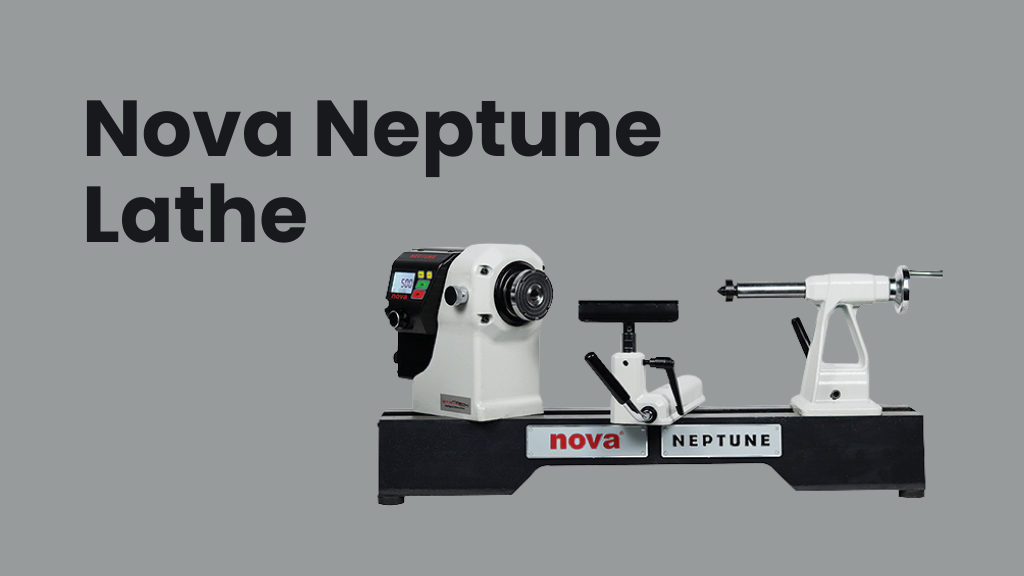Woodturning has evolved from a traditional craft into a modern woodworking specialty supported by advanced machinery. Among today’s most innovative tools, the Nova Neptune Lathe stands out for its use of DVR (Digital Variable Reluctance) motor technology, compact benchtop design, and advanced safety features. Many woodworkers ask whether it justifies its price, how it compares to other lathes, and what its real-world performance looks like. This in-depth guide explores everything you need to know about the Nova Neptune Lathe, including specifications, performance, pricing, advantages, and buyer insights.
Introduction to Nova Neptune Lathe
The Nova Neptune Lathe is part of Teknatool’s range of woodturning lathes that combine cutting-edge motor technology with practical designs. Designed as a midi benchtop lathe, it bridges the gap between entry-level machines and heavy-duty floor models. It is ideal for hobbyists who want professional-level results as well as experienced turners looking for a compact yet powerful lathe.
One of its biggest selling points is the direct-drive DVR motor, which removes the need for belts and pulleys. This technology makes the machine quieter, more reliable, and less maintenance-intensive while delivering consistent torque across all speeds.
The Legacy of Nova Lathes
Before diving into the Neptune model, it helps to understand the background of the Nova brand. Nova lathes are manufactured by Teknatool, a company founded in New Zealand in the 1980s. Teknatool has been at the forefront of woodturning innovation for decades and has introduced several industry-first technologies.
The DVR motor system, which powers the Neptune, was first developed by Teknatool and is now a signature feature across their high-end lathes. With distribution networks worldwide, Nova lathes are now used by professional turners, woodworking schools, and hobbyists across North America, Europe, and Australasia.
Where Are Nova Lathes Made?
Nova lathes are manufactured by Teknatool in New Zealand, with additional global distribution and assembly facilities to serve markets in North America and Europe. The brand has maintained a reputation for producing machines that are both technologically advanced and built to last. Unlike generic imports, Nova machines carry the credibility of a long-established company specializing exclusively in woodworking equipment.
Nova Neptune Lathe Specs
The Nova Neptune is classified as a midi lathe, but its specifications make it powerful enough for serious turning projects. Below is a detailed breakdown of its specifications:
- Motor: DVR Direct Drive Motor (1.75 HP equivalent)
- Speed Range: 100 – 5000 RPM (digitally controlled)
- Swing Over Bed: 16.5 inches (420 mm)
- Between Centers: 24 inches (610 mm)
- Spindle Thread: 1 1/4 inch x 8 TPI
- Spindle Bore: 5/8 inch (15.8 mm)
- Tailstock Bore: 2MT
- Weight: Approximately 135 pounds (61 kg)
- Bed Length: Compact benchtop footprint for small shops
These specifications mean it can handle small spindle projects like pens and table legs, as well as medium-sized bowl turning up to 16 inches in diameter.
DVR Motor Technology Explained
The DVR (Digital Variable Reluctance) motor is the core innovation behind the Nova Neptune lathe. Unlike traditional lathes that rely on belts and pulleys to transfer power, the DVR motor uses a direct-drive system. This means the motor connects directly to the spindle, delivering power more efficiently and with fewer moving parts.
-
Consistent Torque
One of the standout benefits of DVR technology is its ability to maintain steady torque, even at very low speeds. This makes it especially effective for roughing operations where consistent cutting power is required. The motor adjusts automatically to load changes, ensuring smooth performance throughout the turning process.
-
Digital Control
With DVR motors, speed adjustments are digitally controlled rather than mechanically altered with belts. This allows woodturners to make precise, fine-tuned speed selections at the push of a button. Having exact speed control improves both accuracy and safety while handling different materials.
-
Reduced Vibration
Because DVR motors eliminate belts and pulleys, they greatly reduce mechanical vibration during operation. Less vibration means smoother spindle rotation, which translates to a cleaner cut. This also reduces tool chatter, making the turning experience more comfortable and precise.
-
Lower Maintenance
Conventional lathes require regular belt inspections, tension adjustments, and replacements. With DVR technology, those concerns are eliminated since there are no belts to wear out. The direct-drive design minimizes maintenance, offering long-term reliability and reduced downtime in the workshop.
-
Energy Efficiency
DVR motors are designed to consume less power compared to standard induction motors. They optimize energy use by adjusting output based on the workload. This efficiency not only saves electricity but also helps the motor run cooler, extending its lifespan.
Why DVR Matters for Woodturners
For woodturners, DVR technology provides a smoother cut, reduced tool chatter, and superior surface finishes. It combines power, precision, and efficiency in one system. Whether working on rough blanks or delicate finishing, the DVR motor ensures consistent results with less effort from the operator.
Is the Nova Neptune Lathe Good for Woodturning?
The Nova Neptune is widely praised for being both user-friendly and technologically advanced. Its design combines innovative features with practical usability, making it appealing to woodturners of all levels. From digital controls to compact size, it offers a balance between convenience and performance.
-
For Beginners
The digital controls make speed adjustment easy, allowing new woodturners to focus on technique rather than setup. Its built-in safety sensors add an extra layer of protection by preventing overloading during use. This makes the Nova Neptune less intimidating for those just starting out.
-
For Hobbyists
Its compact benchtop design saves valuable workshop space while still delivering professional-grade power. Hobbyists enjoy the balance between portability and strength, making it suitable for both small and moderately sized projects. This balance ensures flexibility without compromising performance.
-
For Professionals
The quiet operation and consistent torque allow professionals to achieve high-quality finishes on challenging projects. Its DVR motor technology ensures smooth cuts with minimal vibration, reducing tool chatter. This makes it a reliable choice for long-term, heavy use in professional settings.
In short, yes, the Nova Neptune is a good lathe for woodturning. Its blend of innovative motor technology and practical design makes it one of the strongest options in the mid-range market. Whether you are a beginner, hobbyist, or professional, this lathe offers value and reliability.
What Is the Average Cost of a Nova Neptune Lathe?
The Nova Neptune Lathe is priced higher than most entry-level machines but offers advanced technology that justifies the cost. On average, buyers can expect to spend between $1500 and $1900 USD, depending on the region and retailer. Many woodturners see this lathe as more than just a tool—it’s an investment in long-term performance.
-
Price Range and Value
The Nova Neptune Lathe usually costs between $1500 and $1900 USD, depending on the region and seller. While it is pricier compared to standard entry-level lathes, this investment comes with valuable benefits. Woodturners find the advanced technology worth the price, especially considering the convenience of digital controls. For many, the machine’s long lifespan makes it a smart purchase.
-
Features That Justify the Price
One of the biggest savings comes from the belt-free DVR motor, which removes the hassle of replacements. The lathe also includes digital controls, offering precision that many traditional lathes cannot match. Its efficient motor ensures durability, lowering long-term maintenance costs. These advantages position the Nova Neptune as more than just a mid-range tool—it’s a lasting solution.
-
Cost-Effectiveness for Woodturners
Despite the higher initial cost, the Nova Neptune is often viewed as a cost-effective choice. Its durability means it outlasts many cheaper alternatives that require frequent upgrades or repairs. Hobbyists and professionals both appreciate the consistent performance and reduced downtime. In the long run, the investment pays off by delivering both reliability and quality results.
Pros and Cons of Nova Neptune Lathe
Every lathe has unique advantages and a few limitations. The Nova Neptune is no exception. Below are its strengths and weaknesses that woodturners should consider before purchasing.
Pros
- DVR motor eliminates belts and pulleys, reducing maintenance.
- Smooth, quiet, and low-vibration performance during operation.
- Wide speed range from 100 to 5000 RPM for flexibility.
- Compact design makes it suitable for small workshops.
- Safety sensors prevent overloads and enhance protection.
- Strong brand reputation backed by Teknatool.
Cons
- Higher upfront cost compared to beginner-friendly lathes.
- Not designed for very large or heavy projects.
- Moderate weight still requires a solid bench for stability.
Comparing Nova Neptune Lathe with Other Lathes
When evaluating the Nova Neptune, many woodworkers compare it to other popular mid-range lathes such as Jet, Laguna, and Record Power. While each brand has its strengths, the Nova Neptune stands out due to its DVR motor technology, digital controls, and low maintenance design. Understanding these comparisons helps buyers choose the best lathe for their needs.
-
Vs. Jet Midi Lathes
Jet Midi lathes are generally more affordable than the Nova Neptune, making them attractive for beginners. However, they rely on belt-driven systems, which can introduce vibration during operation. Belts also require regular tension adjustments and replacement over time. In contrast, the Neptune’s direct-drive motor eliminates these issues, offering smoother and more reliable performance.
-
Vs. Laguna Revo 1216
The Laguna Revo 1216 also provides digital speed control, giving users precise RPM adjustments. However, it lacks DVR technology, which means torque consistency is not as strong as the Neptune. For tasks that require steady power, such as roughing dense blanks, the Neptune maintains better performance. This makes it more suitable for serious hobbyists and semi-professional woodturners.
-
Vs. Record Power Lathes
Record Power lathes are known for solid build quality and durability, making them reliable for long-term use. Yet, they do not include the advanced motor innovations found in the Nova Neptune. Without DVR and direct-drive systems, these lathes may experience more vibration and uneven torque. The Neptune combines both build quality and cutting-edge technology for superior results.
Overall, the Nova Neptune is ideal for those who value advanced motor technology, precision control, and low maintenance. While slightly more expensive than other mid-range models, it offers unique benefits that competitors lack. For woodturners seeking smoother cuts, consistent torque, and a modern lathe experience, the Neptune remains a standout choice.
Real-World Experiences and Reviews
Feedback from woodworking forums and user reviews consistently highlights the Nova Neptune’s quiet performance, reliability, and digital precision. Many turners report achieving smoother finishes and experiencing less fatigue due to reduced vibration.
In independent tests by woodworking magazines, the Neptune’s DVR motor has been described as a game-changer, allowing consistent torque at low speeds that belt-driven machines struggle to achieve.
Maintenance and Care for Nova Neptune Lathe
Proper maintenance ensures the Nova Neptune continues to deliver smooth, reliable performance over time. While the DVR motor reduces traditional maintenance, other components still require attention. Regular care can extend the lathe’s lifespan and prevent issues that could affect accuracy or safety.
-
Keep the Bed and Spindle Clean
Dust and debris can accumulate on the bed and spindle, causing friction and reducing precision. Wipe down these surfaces after each session with a soft cloth. Keeping them clean ensures smooth movement of the tailstock and tool rest. Regular cleaning also prevents buildup that could damage finishes on workpieces.
-
Check Tailstock Alignment
Tailstock alignment is crucial for accurate turning. Periodically check that the tailstock is properly aligned with the spindle. Misalignment can cause wobble, uneven cuts, and excessive wear on tools. Correcting alignment early avoids mistakes and maintains the quality of your projects.
-
Lubricate Moving Parts
Lubrication is essential for the tailstock quill and other moving components. Use light machine oil or manufacturer-recommended lubricant to reduce friction. Regular lubrication ensures smooth operation, prevents rust, and prolongs the life of parts. This simple step helps maintain consistent cutting performance.
-
Store in a Dry Environment
Moisture can lead to rust, corrosion, and damage to metal components. Store your lathe in a dry, temperature-controlled environment whenever possible. Covering the machine when not in use also protects it from dust and accidental spills. Proper storage helps maintain both appearance and function over time.
-
Ensure a Solid Workbench
A sturdy, stable workbench minimizes vibrations during operation. Excessive movement can affect precision and cause tool chatter. Make sure the lathe is securely mounted and level before starting any project. Stability not only improves results but also enhances safety during use.
With consistent care and minimal effort, the Nova Neptune can provide decades of reliable, trouble-free service. Following these maintenance steps ensures both performance and longevity.
Buying Guide: Who Should Choose the Nova Neptune Lathe?
The Nova Neptune Lathe is designed for woodturners seeking a balance between advanced features and compact design. Its DVR motor, digital controls, and low-maintenance operation make it ideal for those who want precision without a full-sized machine. Understanding which users benefit most helps in making a smart purchasing decision.
1. Intermediate Turners
Intermediate woodturners upgrading from a basic mini lathe will find the Nova Neptune a perfect match. It provides more power, consistent torque, and smoother operation. These features allow them to tackle more advanced projects with better accuracy. The digital controls also help refine their skills efficiently.
2. Professional Woodturners
Professional woodturners benefit from the lathe’s precision and quiet operation. It is suitable for small to medium projects without taking up a large workshop space. Consistent torque and minimal vibration help achieve high-quality finishes. This makes it a practical secondary lathe for professionals needing reliability.
3. Hobbyists with Small Workshops
For hobbyists with limited space, the compact benchtop design is ideal. It offers professional-grade power without dominating the work area. The Nova Neptune is lightweight yet robust, making setup and storage easy. Hobbyists can enjoy both versatility and convenience for various creative projects.
4. Schools or Clubs
Educational settings or woodturning clubs can also benefit from the Nova Neptune. Its safety features, including digital controls and reduced vibration, make it suitable for group use. Students and members can learn lathe operation in a controlled, reliable environment. This ensures both safety and productive learning.
If you frequently work on very large or heavy projects, a full-size lathe may be a better option. However, for most intermediate, hobbyist, and professional needs, the Nova Neptune provides an excellent balance of size, power, and innovation. It remains a smart investment for consistent, high-quality woodturning.
Conclusion
The Nova Neptune Lathe is a technologically advanced midi lathe that combines compact design with powerful performance. Its DVR motor sets it apart from competitors, offering consistent torque, quiet operation, and reduced maintenance. While it costs more than entry-level models, it delivers long-term value for serious hobbyists and professional woodturners alike.
For anyone looking to invest in a lathe that merges innovation with reliability, the Nova Neptune is an outstanding choice.
Frequently Asked Questions
Is the Nova Neptune good for beginners?
Yes, its digital controls and safety features make it beginner-friendly.
Where are Nova lathes made?
They are manufactured by Teknatool in New Zealand.
What are the specs of the Nova Neptune Lathe?
It has a 16.5-inch swing over bed, 24 inches between centers, and a DVR direct-drive motor.
What is the average cost of a Nova Neptune Lathe?
The price ranges from $1500 to $1900 depending on retailer and location.
Does the Nova Neptune Lathe require belt changes?
No, the DVR motor eliminates belts and pulleys.




